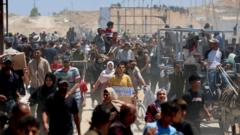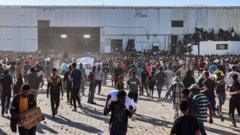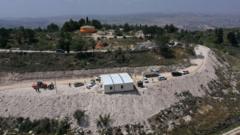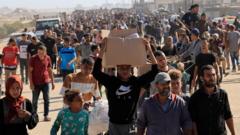Israel's Prime Minister Benjamin Netanyahu stated that Mohammed Sinwar, the Gaza chief of Hamas, has been killed in a military strike, coinciding with ongoing scrutiny of the government's conduct in the war against Hamas.
Israel Confirms Death of Hamas Chief Mohammed Sinwar Amid Ongoing Conflict

Israel Confirms Death of Hamas Chief Mohammed Sinwar Amid Ongoing Conflict
Prime Minister Netanyahu announces the elimination of one of Hamas's most prominent leaders during a parliamentary debate on national security.
In a significant development in the ongoing conflict between Israel and Hamas, Prime Minister Benjamin Netanyahu announced during a special parliamentary session that Israeli forces have successfully “eliminated” Mohammed Sinwar, a high-ranking member of Hamas and brother of the group's previously deceased leader, Yahya Sinwar. Mohammed Sinwar, who was reportedly targeted in a major Israeli air strike on May 13, 2023, near the European hospital in Khan Younis, allegedly played a key role in orchestrating multiple attacks against Israel, including the infamous 2006 kidnapping of Israeli soldier Gilad Shalit.
The Israeli military described the attack that killed Sinwar as part of its continuing efforts to dismantle Hamas's underground networks. Following the strike, which resulted in the death of at least 28 individuals, including civilians, debate surrounding the mortality of Sinwar intensified, with the Israeli military previously refraining from confirming his fate. Hamas has yet to validate or dispute the claims regarding Sinwar’s death.
Netanyahu made his remarks in defense of Israel's military strategy during discussions of the government’s efficacy in addressing the ongoing hostage crisis and defeating Hamas. He emphasized that the military campaign in Gaza has significantly altered the regional landscape and achieved substantial de-escalation of Hamas's capabilities. Netanyahu also mentioned the tragic death toll in Gaza, with over 54,000 reported fatalities amid the conflict that began following a surprise attack on Israel 600 days earlier.
As the conflict progresses, Israel faces mounting pressure and criticism over the humanitarian consequences of its military actions. The European Union and various humanitarian organizations have voiced concerns that Israel's strikes exceed what is necessary for defense against Hamas. The moral and legal ramifications of targeting infrastructure in densely populated areas remain hotly contested.
In another ongoing dynamic, Netanyahu reaffirmed Israel's commitment to recovering its hostages, confirming that 20 of the currently held individuals are alive, with efforts being made to ascertain the status of the others believed to be dead. The situation remains fluid as diplomatic engagements, particularly involving U.S. intermediates, seek to negotiate ceasefires and facilitate the release of hostages. As Israel continues to grapple with its strategic goals and international scrutiny, the implications of these developments on both domestic and international fronts remain to be seen.




















